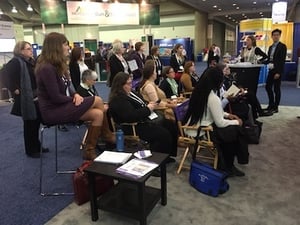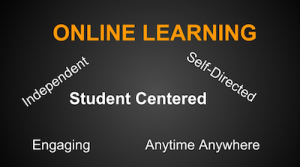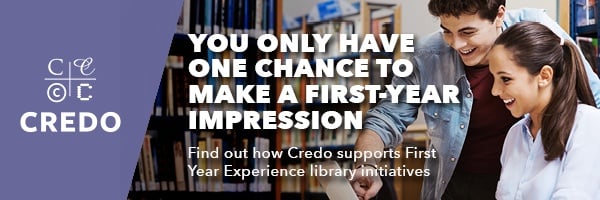Digital Learning Objects: Exploring New Ways to Teach Online Learners
By Raymond Pun and Danielle Rapue
 The ACRL 2017 Conference just ended a few days ago. It was energizing, refreshing and inspiring on many levels. At the exhibit hall in the Credo Reference booth, we gave two short presentations: Library Journal’s Survey Results on Emerging Trends in FYE (read my full report), and Applying Assessment Techniques to the FYE.
The ACRL 2017 Conference just ended a few days ago. It was energizing, refreshing and inspiring on many levels. At the exhibit hall in the Credo Reference booth, we gave two short presentations: Library Journal’s Survey Results on Emerging Trends in FYE (read my full report), and Applying Assessment Techniques to the FYE.
Both talks generated a lot of discussion and engagement from attendees, who also received a copy of ACRL’s newest publication, The First Year Experience Cookbook (Thanks to Credo for ordering them!). After the presentations, there were several questions about digital learning objects and how to support online learning in the FYE. In this blog post, we will cover some tools you can consider for your online FYE programs!
Almost every university in the US is seeing a growing number of online/hybrid classes and digital learners. Are there effective strategies and tools for engaging this community beyond LibGuides? Sure! Here are a few of our favorite tools you might want to explore further for your FYE program:
- Guide On the Side: The University of Arizona Libraries have created this interactive resource that anyone can adapt. Guide On The Side helps students learn about navigating your library’s website, as well as Google, search engines and databases!
- Using Online Survey Tools such as Google Forms/Sites as Digital Platforms: Librarians can use these resources to create online modules or “gaming features” that teach information literacy with embedded videos. This narrative-based tool makes the online experience interactive for the user, and relies on eye-catching graphics to capture and maintain their attention. Here’s an example from University of Minnesota Twin Cities’ Information Fallout Quests that other libraries can consider adopting! Interactive Articulate Storyline Modules is another useful tool to consider: we love that these open files can be downloaded by anyone for their own institution! The memory game is another great example of applying gamification in an information literacy module.
 Online assignments: Need to develop online assignments for your digital learning objects? Consider these resourceful repositories: ACRL PRIMO, ACRL Framework for Information Literacy Sandbox or CORA for online activities and assignments to increase the level of engagement with your distance learners.
Online assignments: Need to develop online assignments for your digital learning objects? Consider these resourceful repositories: ACRL PRIMO, ACRL Framework for Information Literacy Sandbox or CORA for online activities and assignments to increase the level of engagement with your distance learners.- Accessibility and usability testing: It’s a great achievement to create online learning programs for your students! But have you done usability testing on them beforehand? Digital learning objects should be accessible to all of your students because there may be specific challenges in the web design of your programs. Speak to your school’s disability services department and inquire whether your digital learning objects are accessible for individuals with disabilities while ensuring compliance with federal and state regulations. You may also want to try WAVE (web accessibility evaluation tool) to explore your site’s technical and web issues. It’s important to ensure that your library tools can be used by anyone in the community.
- Digital Technology Tutorials: Even students in an online environment may lack the technology skills they need to succeed in courses requiring digital presentations, digital visual aids or data visualization projects. Empower students to train themselves and get comfortable with the software commonly used in higher education. Share links on your course to user friendly free tutorials from GCF Learn Free, or subscription-based Lynda. Help students learn how to use software like Microsoft Office, which will bring them up to speed and increase their confidence toward digital projects.
Are you or your library doing incredible work to support the first year experience? Consider applying for The First Year Experience Innovation Awards!
Danielle Rapue is a recent MLIS graduate of San Jose State University iSchool. She is an adjunct librarian for two California Community College Districts, West Hills Community College and College of the Sequoias.

